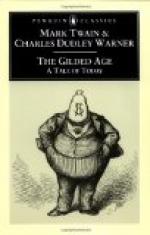—We beg the reader’s pardon. This is not history, which has just been written. It is really what would have occurred if this were a novel. If this were a work of fiction, we should not dare to dispose of Laura otherwise. True art and any attention to dramatic proprieties required it. The novelist who would turn loose upon society an insane murderess could not escape condemnation. Besides, the safety of society, the decencies of criminal procedure, what we call our modern civilization, all would demand that Laura should be disposed of in the manner we have described. Foreigners, who read this sad story, will be unable to understand any other termination of it.
But this is history and not fiction. There is no such law or custom as that to which his Honor is supposed to have referred; Judge O’Shaunnessy would not probably pay any attention to it if there were. There is no Hospital for Insane Criminals; there is no State commission of lunacy. What actually occurred when the tumult in the court room had subsided the sagacious reader will now learn.
Laura left the court room, accompanied by her mother and other friends, amid the congratulations of those assembled, and was cheered as she entered a carriage, and drove away. How sweet was the sunlight, how exhilarating the sense of freedom! Were not these following cheers the expression of popular approval and affection? Was she not the heroine of the hour?
It was with a feeling of triumph that Laura reached her hotel, a scornful feeling of victory over society with its own weapons.
Mrs. Hawkins shared not at all in this feeling; she was broken with the disgrace and the long anxiety.
“Thank God, Laura,” she said, “it is over. Now we will go away from this hateful city. Let us go home at once.”
“Mother,” replied Laura, speaking with some tenderness, “I cannot go with you. There, don’t cry, I cannot go back to that life.”
Mrs. Hawkins was sobbing. This was more cruel than anything else, for she had a dim notion of what it would be to leave Laura to herself.
“No, mother, you have been everything to me. You know how dearly I love you. But I cannot go back.”
A boy brought in a telegraphic despatch. Laura took it and read:
“The bill is lost. Dilworthy ruined. (Signed) Washington.”




